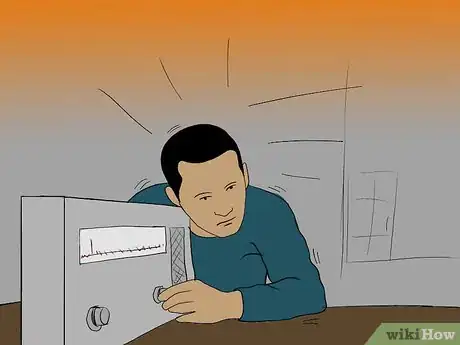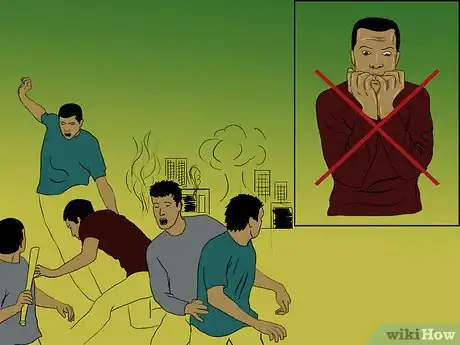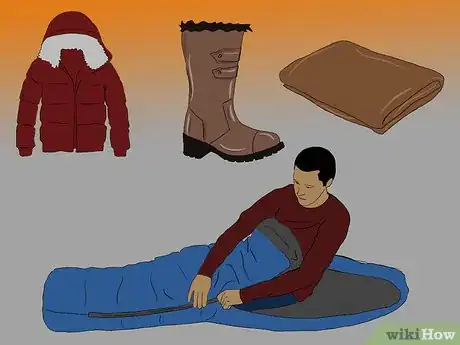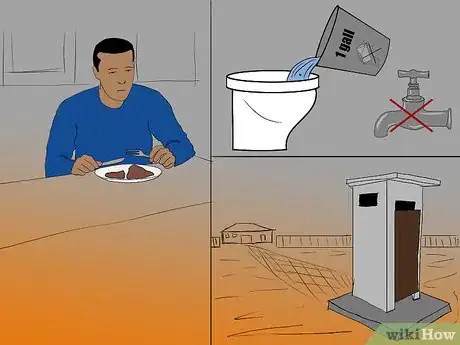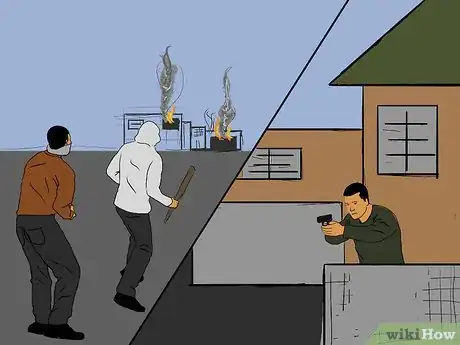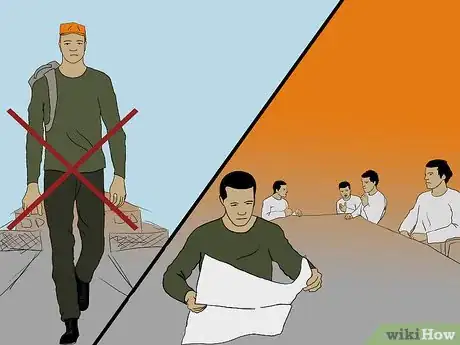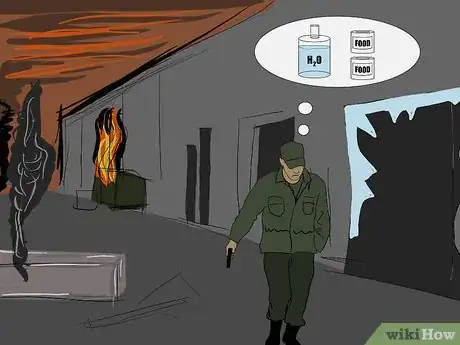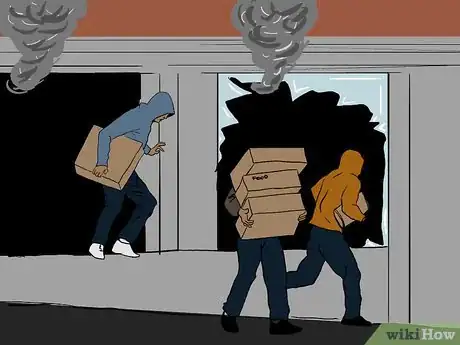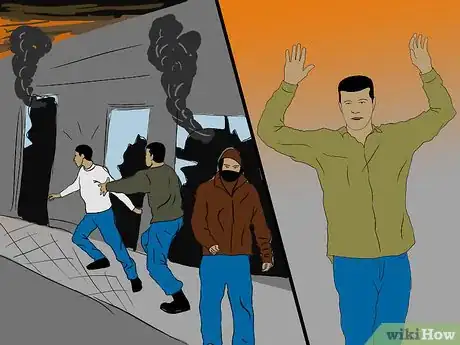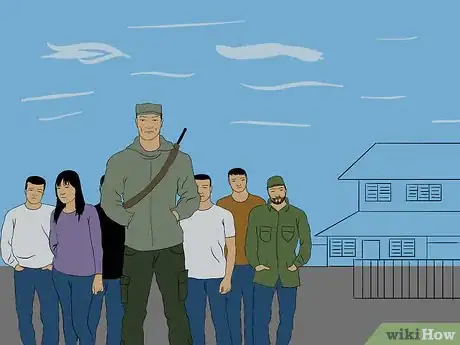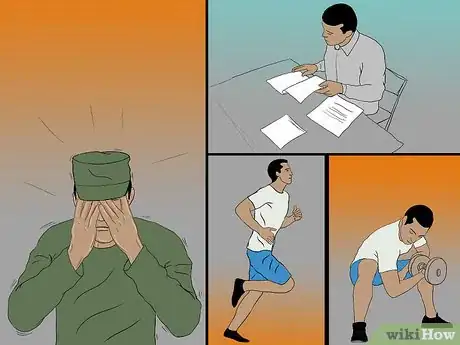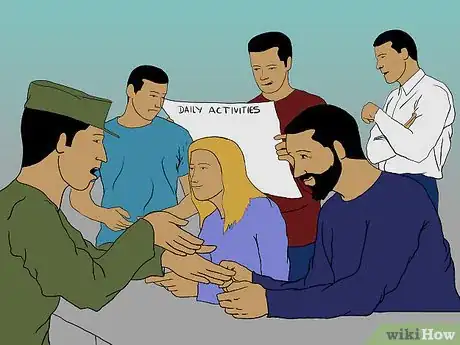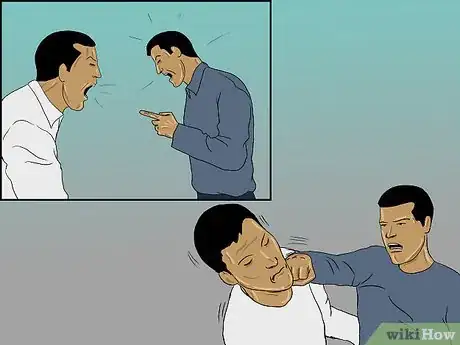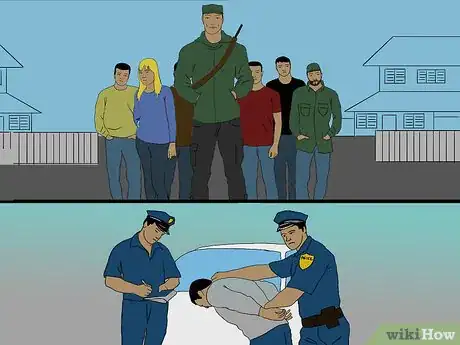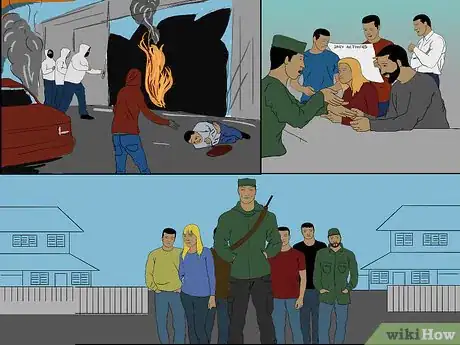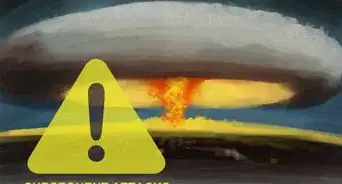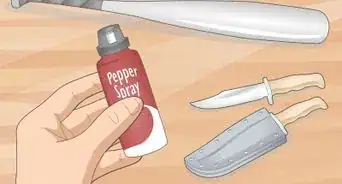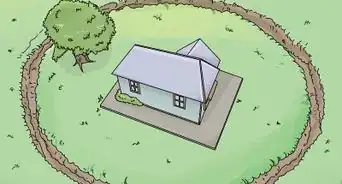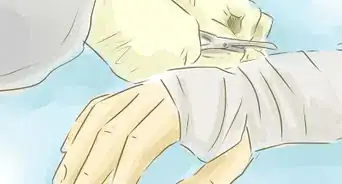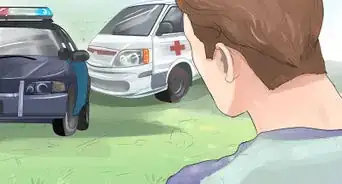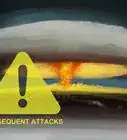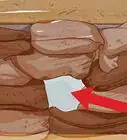wikiHow is a “wiki,” similar to Wikipedia, which means that many of our articles are co-written by multiple authors. To create this article, 38 people, some anonymous, worked to edit and improve it over time.
This article has been viewed 158,243 times.
Learn more...
Many past civilizations from the Romans to the Mayans and Mesopotamians have all met their end. This could be due to varying reasons like failed administration, financial turmoil, rebellion against the authorities, etc. This wikiHow guide will help you and your loved ones survive a breakdown of the social order. You will have to prepare for your survival and security until help can arrive. If help does not come, this article will help you learn how to prepare yourself to face the challenges of this social hazard and work towards the long-term goal of rebuilding the society in the aftermath.
Steps
Watching for Signs of Deteriorating Social Order
-
1Monitor local and political news. Breakdowns of social order usually don’t come out of the blue.
- Ask yourself these questions about the local and political climate:
- “Could this be a temporary or long-term event?”
- “Does this affect me and the safety of my family? If so, how?”
- “Could this turn out to be so dangerous that there’s a chance of me or my family being injured or killed?”
- “How are the people around me reacting to this? Could they behave irrationally towards me?”
- Ask yourself these questions about the local and political climate:
-
2Make sure that the social order really has broken down, rather than some local disturbance, such as a riot, uprising, or strike.
- If you have access to media, check local radio and television news stations, or dial to an emergency station. The government, if communications systems are still functional, should be broadcasting emergency information alerting its citizens of the danger.
Advertisement -
3Remain calm at all times. There may be lots of frightened, desperate people wandering in the aftermath of a breakdown of the social order: this is the greatest danger of all. Do not give in to panic or hysteria -- it impairs rational thinking and adds to the overall chaos.
Staying Safe
-
1Take measure of your overall surroundings and behaviors of nearby people if it is safe to do so.
- Ask yourself: “What resources do I have access to?”, “What do I need?”, “Where do I go to get what I need?”, “What don't I need?” A clear list of essentials is vital to making a solid survival plan.
- A basic list would include[1]
:
- Water
- Bar soap
- AM/FM radio (HAM radios work well for communicating with others as well.)
- Canned food (including a manual can opener)
- Space blanket
- First aid kit (with waterproof bandages, rubbing alcohol or hydrogen peroxide, sutures, etc.)
-
2Consider storing 2 weeks to 3 months supply of items that will make your life easier during a period of social breakdown.[2] If you are stockpiling supplies or hoarding food, you may not want to make it publicly known. You don't want everyone converting your house into the new local grocery store.
- Warm and moisture-wicking clothing is essential even if you live in the warmest climate where the temperature and weather changes erratically. You can still get sick from getting wet and not changing into dry clothing as soon as possible.[3]
- Relying on electricity or natural gas to stay warm and dry is not recommended as it may become unavailable for weeks.
- Safe sources of water may fail for any number of reasons. Of course, your hot water heater is one source of drinking water but it may be filled with sediment. Consider storing water in food grade containers in case of an emergency. 5 gallon (18.9 L) containers can be moved if needed. 55 gallon (208.2 L) barrels are great but impossible to move during an emergency. Store 1 gallon (3.8 L) of water per person per day. A family of 4 will need at least 120 gallons (454.2 L) to survive 30 days.[4]
- Avoid storing water or other materials in dairy jugs as the dairy residue can be hard to wash out and break down faster than non-dairy jugs. Try using an empty water jug or a well-washed plastic container instead.[5]
- Sanitation: You're warm and have plenty to drink. The next essential is staying clean or sickness can and will spread rapidly. If there is no water pressure, the toilet can be flushed by dumping a gallon of water into the bowl after use. Try to use old dish washing or bathing water. Don't waste your drinking water. If there is no water or functioning sewage systems nearby, establish a latrine or a waste bucket far from sleeping, eating, and common areas without plenty of ventilation. Use a bit of that drinking water to wash hands. It is worth it to stay healthy.
- Defense: Often, in social breakdowns, there are people who may be very dangerous and violent due to the lack of law enforcement. One must defend what resources they have from theft. During the 1992 Los Angeles riots, Korean business owners were able to defend their businesses with firearms from being looted and burned by rioters. Owning a weapon and sufficient ammunition may be critical for survival. Also, one must know how to maintain and use the weapon in case a situation might arise. Just make sure that the weapon is legal and if applicable, registered.
- Warm and moisture-wicking clothing is essential even if you live in the warmest climate where the temperature and weather changes erratically. You can still get sick from getting wet and not changing into dry clothing as soon as possible.[3]
Living Afterwards
-
1Consolidate your immediate support networks: friends, close coworkers, family, and neighbors.
- No man is an island; it is crucial to remain connected to a community if one is to survive a breakdown of government. Make sure that your loved ones are safe by keeping them close by and in contact.
-
2Venture out to procure your needed supplies.
- Be aware: in the immediate aftermath of a disastrous breakdown of the social order, if you are in an urban area, there will likely be many, many people looking for the same thing. Looting will be rampant and widespread, and in the chaos, you may not be able to reach your ideal supply centers.
- Have contingencies in mind: cast your net wide, but locally. Do not venture too far from your base of operations in search of needed supplies, and if other people are willing to fight or kill you for it, back away. The key is to be adaptable and to survive.
-
3Having secured your supplies, it will be time to consolidate things back at home. This will call for you to become an effective leader: oftentimes even a well-prepared group can break down due to internal tensions.
- Keep a level head and try to be fair and impartial in dealing with difficult or stressful situations between people.
- You will all be under a great deal of stress: try to encourage stress-relieving activities, such as plenty of exercise, board games and puzzles, reading, and investing time in learning useful practical skills.
- Delegate resources efficiently and according to need. Although some will obviously want special treatment, remember to keep in mind that your resources are limited. If necessary, use triage.
- Give everyone a useful task. Idle hands are the devil's plaything.
- Resolve arguments before they can occur. If you sense tension or anxiety growing between two people, try to get the issue out into the open before it can turn into a potentially deadly confrontation.
- If conflicts are unavoidable, try first negotiating a compromise: speak to each person involved on a personal basis -- don't try to be a dictator. Calm spirits by speaking in a firm, but soothing tone. If the situation continues to degenerate, get friendly, neutral parties to restrain the combatants.
-
4Having created your small community, secured a supply of resources, and taken charge of its leadership, you will be well prepared to wait out the social breakdown until the rule of law is restored.
-
5If it is truly catastrophic, resulting in national destruction and a regression of civilization, you will need to take further steps to ensure that your community becomes the nucleus for the rebirth of society.
Community Q&A
-
QuestionWhat about foods that last a long time, such as dry beans?
 Devin SloanCommunity AnswerThere are many non-perishable foods you can stock up on, such as canned items, dried foods, emergency food rations or MREs (available online or at many Army surplus stores).
Devin SloanCommunity AnswerThere are many non-perishable foods you can stock up on, such as canned items, dried foods, emergency food rations or MREs (available online or at many Army surplus stores). -
QuestionHow do I survive the zombie apocalypse?
 Community AnswerBy being fast, strong, and intelligent. Work out, run regularly to improve your stamina, and research how to survive in the wild on your own. Zombies are slow and very stupid - this should keep you safe. Or, you could become a scientist and invent a formula that vaccinates people against becoming zombies in the first place.
Community AnswerBy being fast, strong, and intelligent. Work out, run regularly to improve your stamina, and research how to survive in the wild on your own. Zombies are slow and very stupid - this should keep you safe. Or, you could become a scientist and invent a formula that vaccinates people against becoming zombies in the first place. -
QuestionIf this happens, how will we keep our pets? I dont want to eat my dog.
 Community AnswerYou wouldn't want to, dogs are great allies. They can bring you food, warn you of intruders, fend off attackers, provide companionship and boost morale.
Community AnswerYou wouldn't want to, dogs are great allies. They can bring you food, warn you of intruders, fend off attackers, provide companionship and boost morale.
Warnings
- Stay away from armed people or people who seem to be behaving erratically: the most dangerous animal on earth is the human being.⧼thumbs_response⧽
- Do not hoard or price-gouge essential items in a period of national emergency. This may result in a fine and/or ban from retailers you attempt to sell price-gouged items through.⧼thumbs_response⧽
- Disease will be extremely dangerous in the social breakdown, with restricted access to medical supplies and medical professionals: be extremely cautious, as even a slipped disk, broken limb, or pulled muscle or tendon can be life threatening. Learn first aid and consult medical manuals if possible.⧼thumbs_response⧽
- The human body can survive at least a week without food, but less than three days without water. A good, clean water supply is crucial.⧼thumbs_response⧽
- If you engage in illegal activities like looting, you may be held accountable by law enforcement if/when order returns.⧼thumbs_response⧽
References
- ↑ http://survival-mastery.com/diy/food_preserv/survival-food-kits.html
- ↑ https://www.fema.gov/pdf/library/f&web.pdf
- ↑ http://survival-mastery.com/basics/collapse-of-civilization.html
- ↑ https://www.cdc.gov/healthywater/emergency/drinking/creating-storing-emergency-water-supply.html
- ↑ https://www.artofmanliness.com/articles/hydration-for-the-apocalypse-how-to-store-water-for-long-term-emergencies
